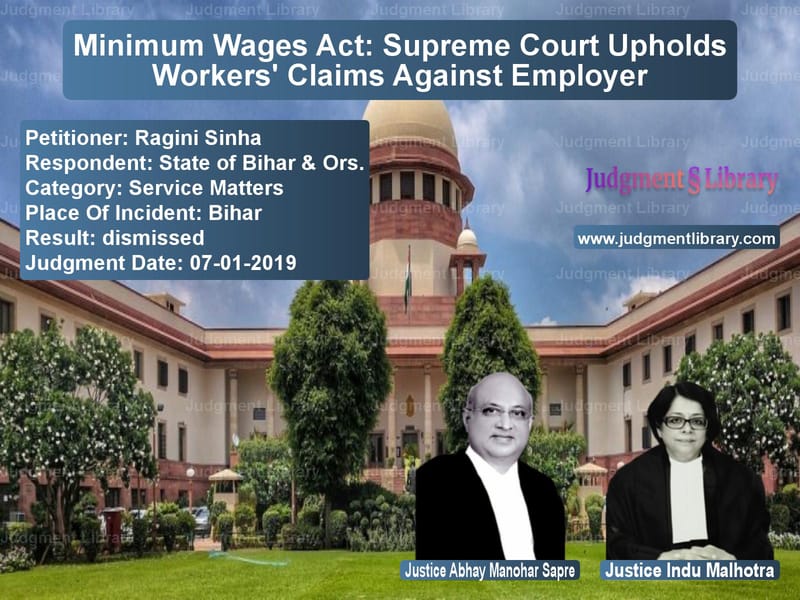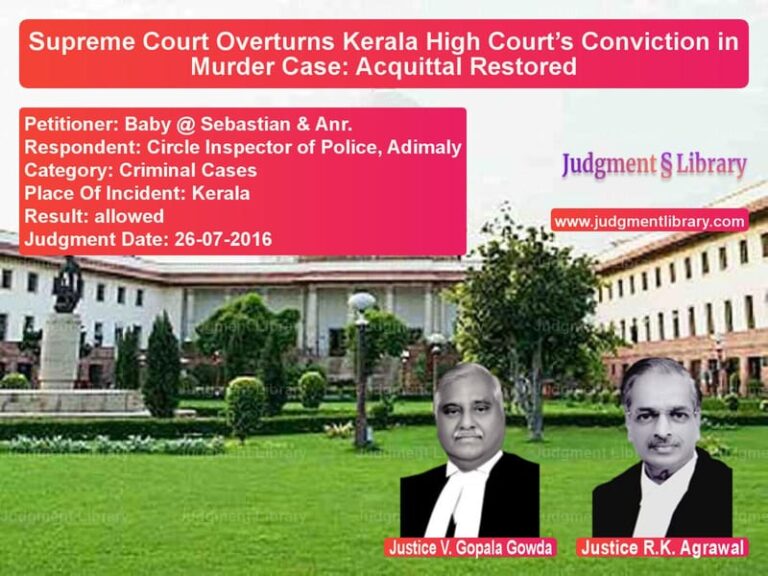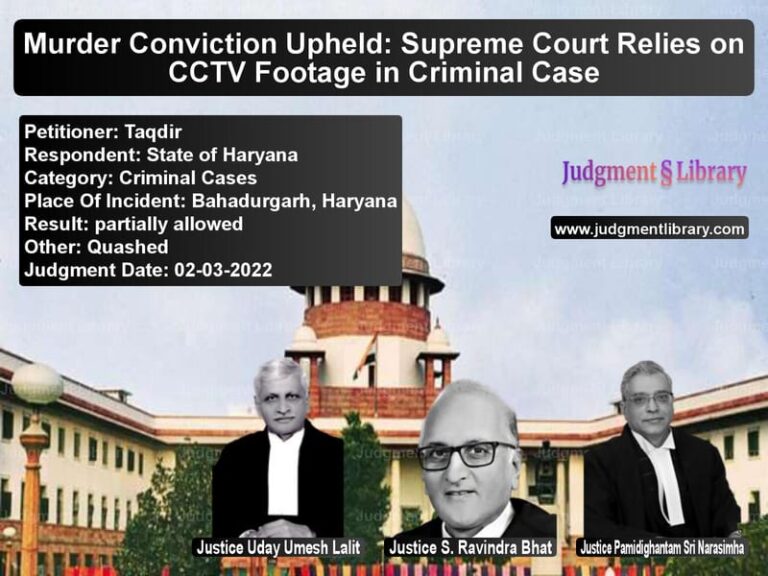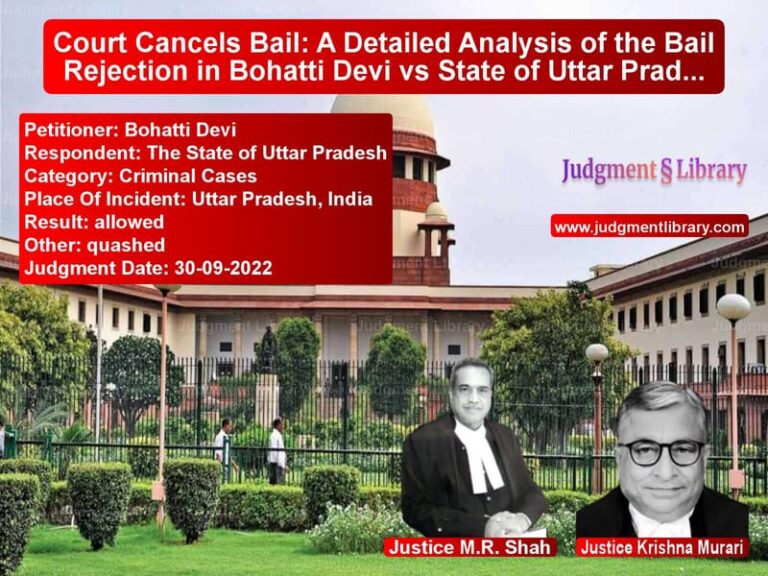Minimum Wages Act: Supreme Court Upholds Workers’ Claims Against Employer
The case of Ragini Sinha vs. State of Bihar & Ors. highlights an important legal battle over unpaid wages under the Minimum Wages Act, 1948. The Supreme Court of India, in its final ruling on January 7, 2019, upheld the decisions of the lower courts that directed the employer to pay the due wages to two workers, Santosh Kumar and Hira Singh, along with penalties.
This case reaffirms the principle that workers, irrespective of their employment tenure, are entitled to minimum wages as per statutory law. It also underlines the Supreme Court’s commitment to protecting the rights of workers and ensuring compliance with labor laws.
Background of the Case
The case involved two laborers, Santosh Kumar and Hira Singh, who worked on land owned by the appellant, Ragini Sinha. The workers alleged that they were employed from January 1, 1991, to October 30, 1992, but were not paid their wages despite rendering services.
Key Facts
- The workers filed claim petitions under the Minimum Wages Act before the competent authority.
- They sought the determination of their wages as per the statutory provisions and requested the employer to pay the due amount.
- The competent authority ruled in favor of the workers and directed the employer to pay the wages along with a penalty.
- The appellate authority upheld the decision of the competent authority.
- The High Court of Patna also confirmed the decision in the employer’s writ petition.
- Finally, the employer approached the Supreme Court through a Special Leave Petition.
Legal Proceedings
Competent Authority’s Decision
The competent authority, after reviewing the claims, found that the workers had indeed worked for the appellant. It ruled that they were entitled to the minimum wages prescribed under the law and directed the employer to make the necessary payment along with an additional penalty.
Appellate Authority’s Ruling
The employer appealed the decision before the appellate authority under the Minimum Wages Act. However, the appellate authority dismissed the appeal and upheld the original order, confirming that the employer had failed to pay the due wages.
High Court Judgment
Aggrieved by the appellate authority’s decision, the employer approached the High Court of Patna. The Single Judge of the High Court dismissed the writ petitions on March 31, 1998, and April 22, 1998. The Division Bench of the High Court also dismissed the employer’s appeal, affirming the orders of the lower courts.
Supreme Court’s Observations
The Supreme Court, after reviewing the case, found that the employer had failed to establish any legal basis for non-payment of wages. The Court noted:
“The question as to whether the two workers ever worked with the appellant and, if so, for how much period and how much wages were payable to them by their employer are the material questions, which were gone into by the competent authority and appellate authority and decided in favor of the two workers.”
The Court further emphasized:
“A concurrent finding of fact recorded on these issues by the two authorities was binding on the High Court while deciding the writ petitions and the intra-court appeals.”
Key Legal Issues
Arguments by the Petitioner (Employer)
- The employer claimed that she was not afforded adequate opportunity to present her case before the competent authority.
- The penalty imposed by the authorities was excessive and disproportionate.
- The claim was filed after a long delay, which should have been considered while deciding the case.
Arguments by the Respondents (Workers)
- The workers had rendered services for the employer and were entitled to minimum wages under the law.
- The competent authority had duly examined the records and found that wages were unpaid.
- The employer failed to provide any substantial evidence to refute their claims.
Supreme Court’s Final Judgment
The Supreme Court upheld the orders of the lower courts and dismissed the appeal filed by the employer. The key directives were:
- The employer must calculate the total unpaid wages along with the penalty as determined by the competent authority.
- The amount must be paid to the legal representatives of the two deceased workers.
- The employer must submit a compliance report to the competent authority within three months.
- A copy of the order must be sent to the legal representatives of the deceased workers to ensure the implementation of the judgment.
The Court concluded:
“Having regard to the nature of breaches committed by the appellant and which were held proved, the authority was justified in imposing the penalty on the appellant.”
Conclusion
This case sets an important precedent in labor law, reinforcing that minimum wages are a statutory right and not a discretionary benefit. It establishes that non-payment of wages attracts penalties and that courts will uphold workers’ claims when they have provided services but have not been paid accordingly.
The Supreme Court’s ruling ensures that employers cannot evade their responsibilities under the Minimum Wages Act and provides a clear legal pathway for aggrieved workers to seek justice.
Petitioner Name: Ragini Sinha.Respondent Name: State of Bihar & Ors..Judgment By: Justice Abhay Manohar Sapre, Justice Indu Malhotra.Place Of Incident: Bihar.Judgment Date: 07-01-2019.
Don’t miss out on the full details! Download the complete judgment in PDF format below and gain valuable insights instantly!
Download Judgment: Ragini Sinha vs State of Bihar & Ors Supreme Court of India Judgment Dated 07-01-2019.pdf
Direct Downlaod Judgment: Direct downlaod this Judgment
See all petitions in Employment Disputes
See all petitions in Pension and Gratuity
See all petitions in Judgment by Abhay Manohar Sapre
See all petitions in Judgment by Indu Malhotra
See all petitions in dismissed
See all petitions in supreme court of India judgments January 2019
See all petitions in 2019 judgments
See all posts in Service Matters Category
See all allowed petitions in Service Matters Category
See all Dismissed petitions in Service Matters Category
See all partially allowed petitions in Service Matters Category







